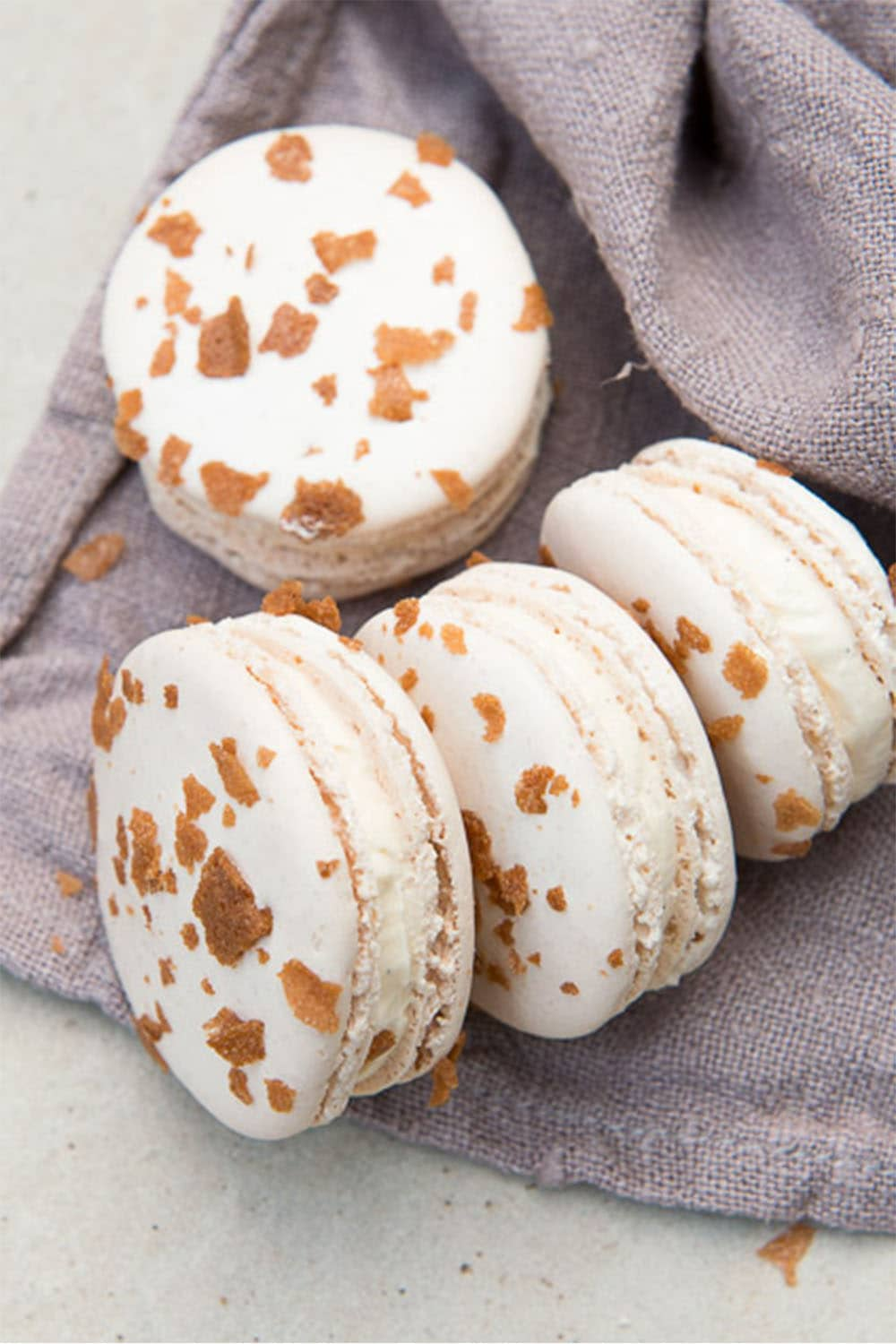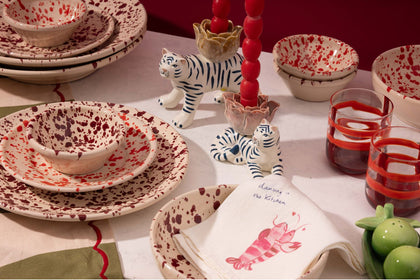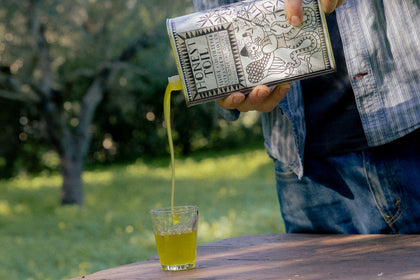
Feuilletine & Salted Caramel Macarons Recipe
by Nicola Lando
-
70 minutes prep time
-
50 minutes cook time
-
Intermediate

Utter the words 'salted caramel' and suddenly everyone's ears perk up. That's the main reason these salted caramel macarons come with a warning - the recipe may make 72 but we assure you they won't last long!
We've paired the salted caramel with a vanilla buttercream - not overly sweet English buttercream (made with icing sugar and butter) but proper, fluffy French buttercream (made by pouring sugar syrup over a mixture of egg and egg yolk.) Dot a pea-sized amount of the salted caramel on the underside of the macarons and as you pipe the vanilla buttercream over the top, the salted caramel will spread to become evenly dispersed inside.
Feuilletine is a little known but magical ingredient. It's essentially cigar biscuits crumbled up into little pieces. In this recipe we've sprinkled the feuilletine over the piped macarons to give them a caramelised, buttery flavour as well as a little crunch.
We've used a small amount of titanium dioxide in this recipe – titanium dioxide whitens the macaron mixture giving the shells a bright white finish. It is a professional patisserie ingredient, and is very highly concentrated so even a tiny amount will have a big effect. Therefore use with caution, and take care to measure it out using high accuracy weighing scales. It is better to use too little than too much.
For the feuilletine macaron shells Serves: 36
- 300g ground almonds
- 300g icing sugar
- 220g egg whites (divided into two 110g portions)
- 300g caster sugar
- 75g water
- 10g titantium dioxide (optional)
- 1/2 tbsp water
- 20g feuilletine
For the salted caramel
- 150g caster sugar
- 150g golden caster sugar
- 100g unsalted butter
- 200ml double cream
- 1 heaped tsp fleur de sel de Guérande
For the vanilla buttercream
- 250g butter, softened
- 2 eggs
- 2 egg yolks
- 180g caster sugar
- 50g water
- 1 tsp vanilla paste
Equipment
- Parchment paper
- Spatula
- Piping bags
- Stand mixer
- 10mm piping nozzle, or use the plastic tip that may have come with an old piping set - used for other tips to screw into
- Thermapen thermometer
To make the feuilletine macaron shells
- Begin by weighing out the icing sugar and ground almonds in a bowl.
- Transfer to a food processor and whizz for a few seconds until fine. (Be careful not to over mix or the almonds will begin to release their natural oils and cause the finished macaron shells to look 'blotchy'.)
- In a large bowl pour 110g egg white over the almond/icing sugar and leave it to sit on the surface without stirring whilst you prepare the Italian meringue.
- Line 4 large baking trays with parchment paper.
- Pour the second half of the egg whites (110g) into a stand mixer with a whisk attachment.
- Heat the caster sugar and 75g water in a pan. Monitor the temperature with a cooking thermometer and when it reaches 117°C start to beat the egg whites on full speed until they just reach the soft peak stage.
- When the sugar syrup reaches 121°C pour slowly over the egg whites whilst they are whisking.
- Whisk for 3 minutes on high speed. Reduce the speed to medium and whisk for a further 2 minutes. Then whisk on a slow speed until the Italian meringue has cooled to 50°C.
- Use a spatula to fold the Italian meringue into the almond mixture.
- When the mixture is homogenous, add the titantium dioxide dissolved in the water. This will loosen the mixture slightly.
- Keep folding the mixture gently until it begins to relax and starts to turn glossy at the edges. Another way to test the consistency is to dap the mixture with the end of the spatula, the imprint should fade in around 20 seconds.
- Place a round 10mm nozzle in a piping bag and fill with the macaron mixture. Pipe rounds with a 3.5cm diameter spaced 2cm apart.
- Sprinkle the feuilletine over the macarons.
- Leave the macarons to dry out overnight or place in a dehydrator on the lowest setting for 20 minutes. A dry skin should form on the surface of the macarons so you can run your fingers over them without them becoming sticky.
- Pre-heat the oven to 160°C (fan oven) - the ideal cooking temperature can range from 140°C - 170°C depending on the oven.
- Cook the macarons for 12 minutes. Open the door after 8 minutes to release the steam and again after 10 minutes.
- Transfer to a cooling rack. Wait for the macarons to cool before peeling them off the parchment paper.
To make the salted caramel
- Heat the sugar in a medium saucepan. As the sugar begins to melt swirl the sugar around the pan every now and again.
- Once the sugar is a rich golden colour, remove from the heat and immediately pour over the double cream, stirring constantly. Add the fleur de sel.
- Once the salted caramel has cooled for 5 minutes add the butter in cubes little by little until the sauce is smooth and silky.
- Dab a 1cm circle of salted caramel on the underside of half of the macarons.
To make the vanilla buttercream
- Begin by softening the butter - leave it at room temperature or cut into pieces and heat on a low heat in the microwave. It should be very soft but not melted.
- Measure out the eggs and egg yolks into a stand mixer.
- Heat the water and sugar in a pan on the hob until it reaches 117°C - use a thermapen to monitor the temperature.
- When the sugar syrup reaches 117°C start to whisk the egg mixture. When the syrup reaches 121°C and the eggs are very fluffy pour the syrup over them whilst whisking.
- Whisk on a high speed for 2 minutes, then reduce the speed to medium and continue to mix until the eggs cool and the bowl no longer feels hot.
- Add the softened butter and vanilla paste and whisk for 2-3 minutes until the mixture is light and fluffy.
- Place a 10mm nozzle in a piping bag and fill with the vanilla buttercream. Pipe rounds on half of the macarons, covering the salted caramel. Top with the other half shells and refrigerate for 24 hours before consuming. The macarons will last 3-4 days in the fridge in a sealed container but are at their optimum the day after they are made.


About the author
Nicola is co-founder and CEO at Sous Chef. She has worked in food for over ten years.
Nicola first explored cooking as a career when training at Leiths, before spending the next decade in Finance. However... after a stage as a chef at a London Michelin-starred restaurant, Nicola saw the incredible ingredients available only to chefs. And wanted access to them herself. So Sous Chef was born.
Today, Nicola is ingredients buyer and a recipe writer at Sous Chef. She frequently travels internationally to food fairs, and to meet producers. Her cookbook library is vast, and her knowledge of the storecupboard is unrivalled. She tastes thousands of ingredients every year, to select only the best to stock at Sous Chef.
Nicola shares her knowledge of ingredients and writes recipes to showcase those products. Learning from Sous Chef's suppliers and her travels, Nicola writes many of the recipes on the Sous Chef website. Nicola's recipes are big on flavour, where the ingredients truly shine (although that's from someone who cooks for hours each day - so they're rarely tray-bakes!).


